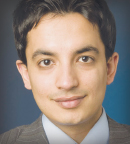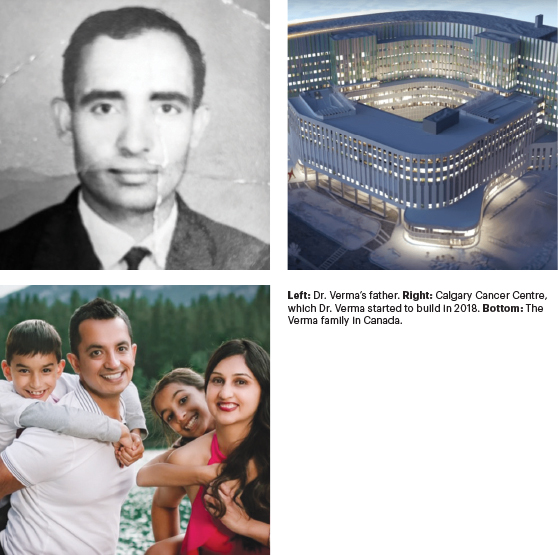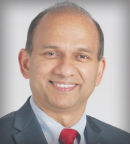In this installment of The ASCO Post’s Living a Full Life series, guest editor, Jame Abraham, MD, spoke with Sunil Verma, MD, the Global Head of Oncology, Medical, at AstraZeneca.
Sunil Verma, MD, was born in Zambia, a landlocked country at the crossroads of Central, Southern, and East Africa. “My dad’s an engineer, and he was working in Africa when I was born. Their children’s education was really important to my parents, and when I was 6 years old, I went to India with my mom. My older brother and sister were already in boarding school in India, so from age 6 to 12, I lived in India with my family. I think it gave me a sense of foundational values that have helped me throughout my life,” said Dr. Verma.
Sunil Verma, MD

- On developing the new cancer center in Calgary: “All of our meetings and planning sessions were guided by one central question: If we think about cancer care in the next 10, 15, 30 years, what would that look like?”
- On the transition from academic medicine to industry: “As long as we’re driven by science with the ultimate purpose of meeting the needs of patient care, I feel the foundation of academic-driven and patient-focused medicine is always going to be there, whether you’re in industry or in the clinic.”
- On aspiring oncologists: “My advice to young doctors thinking about entering the field is always be humble and be curious but not afraid to take risks.”
In 1988, when Dr. Verma was 13, his family moved to Calgary, a city in the western Canadian province of Alberta. “We went through an incredible weather transition, going from +40°C in India to –40°C in a couple of months. I went to William Aberhart High School and later the University of Calgary, where I received great mentorship at every level.”
He continued: “I started to get into science and was intrigued by biology and by understanding the underlying causes of diseases. I did a couple of summer electives in neurology at that time, and then very early in my career, when I was only 19 years old, I got accepted into medical school at the University of Alberta. In a way, I grew up in medical school, seeing life and death and the human impact of disease. I learned things that have stayed with me to this day.”
Asked if he had any early mentors, Dr. Verma responded: “In my third year of medical school, an oncologist named Dr. Martin Palmer, who was Associate Dean of Education, introduced me to the oncology clinics, and largely because of his mentorship, I gravitated toward oncology. What attracted me most about oncology was the longitudinal aspect of care for patients with cancer and having the honor and privilege to be part of patients’ lives during these pivotal life-transforming periods. I was fascinated with the process of bringing exciting new therapies into our clinical community and being part of the transformation in cancer care in real-time.”
Mentors and Clinical Research
After completing his residency, under the mentorship of Dr. Charles Butts and Dr. John Mackey, Dr. Verma entered his oncology fellowship program at Sunnybrook Hospital in Toronto, Canada, where he worked with three valuable mentors: Drs. Kathy Pritchard, Maureen Trudeau, and Mark Clemons. “I was working with Mark, and my focus was setting up a local advanced breast cancer clinic. We were starting to set up neoadjuvant programs, and I was also working very closely with Maureen and Kathy on the metastatic breast cancer studies. But my focus was still very much more education-driven as I was finishing my Master’s in Education,” said Dr. Verma.
In 2004, following his fellowship, Dr. Verma joined the faculty at Sunnybrook Hospital as a clinical educator. During this formative period, Dr. Verma also earned a master’s in medical education at the University of Southern California. “I wanted the skill set to build a really strong educational program and to create a multidisciplinary fellowship program in breast cancer—along with conducting clinical research, which is part and parcel of what I do. But at that time, the primary focus was on cancer education, along with creating residency and fellowship education roles,” said Dr. Verma.
Transition to Clinical Trialist
Dr. Verma began working with residents and fellows from around the world who were attracted to Sunnybrook because of the bourgeoning breast cancer fellowship program. “Our clinics started to get really busy, and we initiated research into a number of novel treatments including anti-HER2 therapies. That area of focus helped me drive an even stronger interest in clinical studies and how they translate into practice, while staying mindful of how we should be designing trials to ensure the right inclusion criteria for patients. I also spent time mentoring and guiding residents and fellows in these areas,” he said.

As the clinical trials program at Sunnybrook Hospital expanded, Dr. Verma’s reputation as a trialist grew as well. “I was involved in some of the early studies that we were doing with T-DM1 [ado-trastuzumab emtansine]. I think my contribution to trial design led to my participation in pivotal trials in 2007, 2008, and onward. So, from 2007 to about 2015, I was part of some important clinical trials at the Sunnybrook Cancer Center, and I began to achieve global recognition for the type of study designs and studies we were executing. Sunnybrook became a very important breast cancer center, generating programs through which different community centers referred patients to have access to these clinical studies,” said Dr. Verma.
Reputation as Trialist Grows
dr. verma’s reputation as a leader and trialist continued to gain international recognition. In 2015, he was offered a chance to build a cancer center from the ground up, a daunting yet irresistible opportunity for the ambitious young oncologist who had, as he put it, “caught the leadership bug.” The Tom Baker Cancer Centre, in Calgary, Alberta, recruited Dr. Verma to run the existing center and to build a new, state-of-the-art cancer center.
“So, my wife, who’s been an incredible partner throughout my career, agreed to leave Toronto, a city she loved, and relocate in Calgary. From January 2016 to July 2019, I took on the role of running and developing the new cancer center, always keeping in mind that we were building an institution for the future. All of our meetings and planning sessions were guided by one central question: If we think about cancer care in the next 10, 15, 30 years, what would that look like? It was, to say the least, a great experience, in which I honed my leadership skills,” said Dr. Verma.
Another Career Move
In april 2019, Dr. Verma received a call from José Baselga, MD, PhD, who was then AstraZeneca’s Executive Vice President of Oncology Research & Development. “José had a fire in his belly, and he had this sense of urgency. In retrospect, it seemed like he knew he didn’t have much time left. He told me that together, we could do something great—rewrite the cancer textbooks, in fact. I met with José in his role as the head of Oncology R&D at AstraZeneca at the American Association for Cancer Research meeting in 2019. After our discussions, I was confident they were doing things for the right reason and felt comfortable in joining AstraZeneca, which I did on August 5, 2019. I was given two roles at the outset: Global Clinical Head of Breast Cancer and Head of Breast Cancer Strategy,” said Dr. Verma.
“It has been an amazing ride. I led the breast cancer program, and we went from 3 studies to more than 20 studies. We also went from two or three good assets to now six or seven really good medicines,” he continued.
“I really enjoyed working with José. He and I used to stand by the whiteboard and draw the map of future breast cancer care. I remember José saying: ‘We need to blow up the swim lanes and not be as fixed in our approach as we redraw and reassess how we bring about the next transformation in our breast cancer clinical trials strategy.’ Then in March 2021, the entire oncology community was shaken by José’s untimely death. I drew from the experience of working with him in everything and anything that I do moving forward. By mid-2021, we began to see the impact of our portfolio on patient care, and we could also see the incredible potential ahead,” said Dr. Verma.
Leadership Role
In December 2021, Dr. Verma assumed the title of Global Head of Oncology, Medical, at AstraZeneca. “It’s a great opportunity for me to expand and build on my skills and interests. I would best describe myself as a builder and enabler. Coming from Canada, I always use a hockey analogy. I’m like a Zamboni driver, cleaning up the ice so people can skate faster and better. I always look for opportunities that allow me to build and scale up and also to bring people along a coordinated cohesive vision. Whether it’s the cancer center in Calgary, the fellowship program, the clinical trials program in Toronto, the breast cancer work we did at AstraZeneca, or my current role, I look for opportunities that are unfinished—and ready to scale up and shine bright,” he said.
Asked about the transition from academic medicine to industry, Dr. Verma commneted: “As long as we’re driven by science with the ultimate purpose of meeting the needs of patient care, I feel the foundation of academic-driven medicine and patient-focused medicine is always going to be there, whether you’re in industry or in the clinic. That’s why I think the transition was not too disruptive. However, in both academia and clinical care, people look at oncologists, physicians, and clinicians as the ultimate decision-makers. What I learned when I joined industry is that you have a very strong clinical voice, which is an important voice, but not the sole voice, because there are going to be multiple perspectives in the decision tree, and you have to work across functions to drive the decision that will ultimately benefit patients and clinical community.”
Guest Editor

Jame Abraham, MD, FACP
Dr. Verma added: “AstraZeneca has offered me a place where I can mesh my accumulated experience and enthusiasm with others on the global oncology stage, which is pretty exciting, given the breadth of our scientific knowledge. Throughout my career, I have been driven to make changes that bring real benefits for people with cancer. I believe we are at an unprecedented time when the cancer care landscape will be transformed. And I also believe the team here at AstraZeneca will play an important role in that transformation,” said Dr. Verma.
Closing Thoughts
How does a super-busy oncology leader decompress? “First and foremost is family. I have a great wife and two very lively and engaged children—a boy and a girl, 10 and 12, respectively,” Dr. Verma said. “I am a big tennis player. Let me rephrase that: I’m maybe an average tennis player with big aspirations. And maybe my second physical activity would be hiking. So, I’m an outdoorsy sort of individual. And I’m an avid early adopter tech guy, which can, as we know, have its drawbacks!”
Dr. Verma concluded: “I still have the hunger to grow professionally and advance the great field of oncology. I think most people who work in oncology are attracted by the kindness, compassion, and empathy this field represents. I hope that community spirit we have will bring even more passionate people and show what we can accomplish as the oncology community. My advice to young doctors thinking about entering the field is always be humble and be curious but not afraid to take risks.”
DISCLOSURE: Dr. Verma is Senior Vice President and Global Head of Oncology, Medical, at AstraZeneca.

